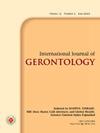短期吸入H_2改善老年妇女的认知功能:一项初步研究
IF 0.3
4区 医学
Q4 GERIATRICS & GERONTOLOGY
引用次数: 1
摘要
我们分析了吸入4周H_2对65岁及以上妇女认知能力的影响。参与者(n = 13)为社区居住的老年妇女(年龄68.0±3.0岁;重量66.9±10.3 kg;身高161.1±5.8 cm),自愿参加这项开放标签试点试验(ClinicalTrials.gov, NCT02830854)。吸入H_2 15分钟,每天1次,连续4周。在基线和随访时采用迷你精神状态测试(MMSE)和阿尔茨海默病评估量表认知亚量表(ADAS-Cog)评估认知功能。H_2干预显著提高MMSE总分(平均14.2%;P < 0.01),从而改善认知功能,从基线时的轻度痴呆(得分25.6分/ 30分)到随访时的正常认知(得分高于27分)。此外,吸入H_2显著提高了ADAS-Cog评分,其中单词回忆测试成绩显著提高(p < 0.01),单词识别成绩显著提高(p = 0.01)。这项初步试验似乎证实了先前的动物研究,表明气体H_2可能被认为是与年龄相关的认知健康的有益因素。本文章由计算机程序翻译,如有差异,请以英文原文为准。
Short-Term H_2 Inhalation Improves Cognitive Function in Older Women: A Pilot Study
We analyzed the effects of 4-week H_2 inhalation on cognitive performance in women aged 65 and above. The participants (n = 13) were community-dwelling older women (age 68.0 ± 3.0 years; weight 66.9 ± 10.3 kg; height 161.1 ± 5.8 cm) who volunteered to participate in this open-label pilot trial (ClinicalTrials.gov, NCT02830854). The participants received H_2 by inhalation for 15 min once per day for 4 weeks. The cognitive function was assessed using the Mini Mental State Exam (MMSE) and Alzheimer disease assessment scale cognitive subscale (ADAS-Cog) at baseline and at follow up. H_2 intervention significantly increased total MMSE scores (for 14.2% on average; p < 0.01), thereby improving cognitive function from mild dementia at baseline (a score of 25.6 out of 30) to normal cognition at follow up (above a cut score of 27). In addition, ADAS-Cog scores were significantly improved by H_2 inhalation, with better performance for word recall test (p < 0.01), and improved word recognition (p = 0.01) at post-administration, respectively. This pilot trial seems to corroborate previous animal studies, suggesting that gaseous H_2 might be considered as a beneficial agent for age-related cognitive health.
求助全文
通过发布文献求助,成功后即可免费获取论文全文。
去求助
来源期刊
CiteScore
0.60
自引率
0.00%
发文量
0
审稿时长
6-12 weeks
期刊介绍:
The Journal aims to publish original research and review papers on all fields of geriatrics and gerontology, including those dealing with critical care and emergency medicine.
The IJGE aims to explore and clarify the medical science and philosophy in all fields of geriatrics and gerontology, including those in the emergency and critical care medicine. The IJGE is determined not only to be a professional journal in gerontology, but also a leading source of information for the developing field of geriatric emergency and critical care medicine. It is a pioneer in Asia.
Topics in the IJGE cover the advancement of diagnosis and management in urgent, serious and chronic intractable diseases in later life, preventive medicine, long-term care of disability, ethical issues in the diseased elderly and biochemistry, cell biology, endocrinology, molecular biology, pharmacology, physiology and protein chemistry involving diseases associated with age. We did not limit the territory to only critical or emergency condition inasmuch as chronic diseases are frequently brought about by inappropriate management of acute problems.

 求助内容:
求助内容: 应助结果提醒方式:
应助结果提醒方式:


